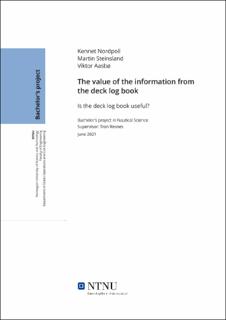| dc.contributor.advisor | Resnes, Tron | |
| dc.contributor.author | Nordpoll, Kennet | |
| dc.contributor.author | Steinsland, Martin | |
| dc.contributor.author | Aasbø, Viktor | |
| dc.date.accessioned | 2021-09-24T19:20:11Z | |
| dc.date.available | 2021-09-24T19:20:11Z | |
| dc.date.issued | 2021 | |
| dc.identifier | no.ntnu:inspera:85579550:85582387 | |
| dc.identifier.uri | https://hdl.handle.net/11250/2782237 | |
| dc.description.abstract | Dekksdagboka er velkjent i den maritime industrien og er om bord i større fartøy verden over. Denne oppgaven har studert bruken av dagens dekksdagbok og undersøkt nytten av denne. Dette ble undersøkt ved å se nærmere på hvilke kolonner som dekksdagboka består av som er viktige, i hvilken grad informasjonen som er skrevet ned kan brukes, og hvem som eventuelt er interessert i informasjonen. Følgende problemstilling ble utarbeidet:
«Er dekksdagboka nyttig?»
Studien har hentet inn informasjon ved å intervjue representanter fra ulike deler av den maritime bransjen som bruker dekksdagboka. Gjeldende regler for bruk av dekksdagbok, historisk bruk av dekksdagboken og andre systemer som logger informasjon blir brukt som teoretisk rammeverk i oppgaven. Problemstillingen ble utarbeidet i samarbeid med klassifiseringsselskapet DNV.
Datainnsamlingen, i form av intervju, viser at både mannskap ombord på skip og interessenter på land har en gjennomgående lik holdning til dekksdagboka. Fra mannskapets perspektiv viser intervjuene at en stadig er opptatt av å føre inn informasjon i dekksdagboka for å oppfylle krav, uten å tenke mer på om det har noen hensikt. For personell på land fremkommer også holdningene om å oppfylle krav. Videre fremkommer det at dekksdagboka er en viktig kilde til én type informasjon, nemlig den som ikke kan standardiseres. Dette er for eksempel informasjon som angår vurderinger og tiltak basert på disse vurderingene.
Det kommer frem av intervjuene at dekksdagboka er en god kilde til ikke-standardisert informasjon. Mye av informasjonen som kan standardiseres blir registrert av andre systemer på broa, i tillegg til i dekksdagboka. Dette medfører at samme informasjon blir lagret på flere forskjellige måter. På bakgrunn av dette kan dekksdagboka slik den er i dag reduseres i omfang, ved å fjerne kolonner som inneholder informasjon som allerede finnes. Formålet med dette er å redusere tiden mannskapet bruker på å notere standardiserbar informasjon. Denne informasjonen finnes mer nøyaktig i andre systemer. Det konkluderes med at dekksdagboka er utdatert slik den er i dag. | |
| dc.description.abstract | The deck log book is well known within the maritime industry and can be found on larger vessels all around the world. This thesis has studied the use of today’s deck log book and analysed the usefulness of the deck log book. This was done considering which columns in the deck log book that are important, to what degree the information written down can be used, and who is eventually interested in this information. To have a clear goal of the thesis the main issue is:
«Is the deck log book useful?”
The thesis has gathered information by interviewing different parties within the maritime industry who use the deck log book. Current rules and regulations regarding the use of the deck log book, historical use of the deck log book, and other systems logging this information, is used as theoretical framework for the thesis. The main issue for this thesis was developed with the help of DNV.
The data collection, using interviews, revealed that both crew on board the ships and stakeholders on shore has a similar attitude towards the deck log book. Extracted from the interviews, the crew indicate that they are entering the information in the deck log book to comply with requirements. They do this without considering whether it has a purpose. The same attitude of complying with requirements is also clear from personnel on shore. Something else that emerges from the interviews is that the deck log book is an important source for one type of information, the one that cannot be standardized. This is information regarding assessments and measures taken based on these assessments by the crew.
As told by the interviewees, the deck log book is a good source for non-standardized information. Much of the information that can be standardized is also registered on other systems on the bridge, additionally to the deck log book. This means that the same information is stored in several different ways. On this basis the deck log book can, as it is today, be reduced in extent. This can be done by removing the columns that contain information already being stored elsewhere. The purpose is to reduce the time used by the crew to note standardizable information. This information is found more accurate in other systems. As a conclusion the deck log book is outdated as it is today. | |
| dc.language | eng | |
| dc.publisher | NTNU | |
| dc.title | The value of the information from the deck log book | |
| dc.type | Bachelor thesis | |
